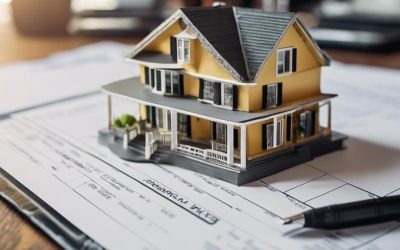The population of London currently stands at a little over eight million people. That number continues to rise as more and more young professionals continue to move to London in search of better jobs. With all these new faces appearing in London, now is the perfect time to start purchasing rental property there.
Buying rental property in London is typically an extensive process that involves choosing a property, examining mortgage options, hiring a lawyer, and going through the offer and exchange process with the seller. The entire process can take anywhere from 3 to 6 months.
There are quite a few things you’ll need to do if you want to purchase a rental property in this area. However, in some cases, the process can be relatively simple. This depends on your knowledge base about property buying, how much capital you have upfront, and what expectations you and the seller have of each other. Read on to learn more about buying rental property in London.
The Process of Buying Rental Property in London
Buying a rental property in London usually takes time and patience. Many factors contribute to the purchase process, as the buyer and seller typically spend a lot of time negotiating.
Many terms must be decided on, such as whether the lease will be a freehold or leasehold agreement and how long the contract will last. We’ll get into more detail with that shortly. The seller has to feel comfortable with you and with the terms.
Before you start the purchase process, you’ll need to decide on the type of property you’d like to purchase. In London, the most common properties are flats and terraced housing, but the areas on the outskirts of the city also feature private homes, detached houses, and even mansions. However, you’re likely not going to be purchasing a mansion to rent out, so I won’t be going into much detail with that one.
The thing that makes purchasing rental property in London a little complicated at times is obtaining a mortgage. This isn’t especially hard to do if you’re a UK citizen or resident with a substantial income and good credit, but this can be enormously difficult if you aren’t a resident or don’t have the proper background to get approved for the loan.
Four Main Types of Properties in London
London has four main types of properties, but today I’ll be concentrating primarily on the first three.
- Flats. They are small properties that range between a studio and three bedrooms. These properties are often referred to as apartments in the United States. They are usually smaller than detached houses. Flats are the most common type of property in London and may be one of the best for renting.
- Terraced houses. They are small homes that are interconnected with other houses. These houses can sometimes be called town houses They are usually connected with other houses on both sides. Because of this, they typically cost less and are solid choices for rental properties.
- Semi-Detached houses. These are typically family homes, they are built in a pair so the house is attached to another one. You would find these houses usually in the suburbs.
- Detached houses. These are stand-alone houses, sometimes called single-family homes. These properties work well for larger families. However, they’re not ideal for renting at this time because most people relocating to London are single individuals who will gravitate towards flats and terraced houses.
- Mansions. They are enormous houses with plenty of space for living and entertaining. Mansions are usually situated on large plots of land and contain various additions to the house, such as pools, gardens, detached villas, and more. Generally, only people with enough wealth to own property live in mansions, so you’ll have a hard time finding a tenant who can afford to pay rent for a mansion.
Deciding on a Property
Deciding on a property is the first step in the process of buying. London, as mentioned, is a fantastic place to buy rental properties as the demand is almost endless. Rental properties are a great way to get started with investing, provided you have some capital and good credit.
However, there are certain things you’ll need to look out for when shopping for rental properties, even if you’re already a homeowner yourself. Don’t make the mistake of looking for properties you would live in yourself when really you’re just looking for an investment property to make some extra money. Make sure it’s not an emotional decision, it needs to be a financial decision.
Features To Look For When Deciding on a Rental Property
You’ll want to pay close attention to several things when deciding what property to buy. Remember, you’re not looking for the perfect home for you and your family–you’re looking for a home that will turn a profit. Work smarter, not harder, by following these tips on what to look for when choosing a rental property.
- Examine the neighbourhood. The area you buy in is the primary determining factor on whether or not the property will rent well. Unless a person suffers very heavily from a financial standpoint, they will be looking for properties in a reasonably safe and clean neighbourhood. Other factors to consider concerning the neighbourhood include what types of people live nearby (students, elderly, families, etc.) and what’s nearby.
- Look into property taxes. Property taxes are another factor in purchasing rental properties. Taxes vary widely from area to area, and knowing how this will impact your profit moving forward is essential. Even if you’re gaining a substantial rental income each month, property taxes can steal it away, and you can end up with very little. Speak to an accountant if you need advice in this area.
- Pay attention to the schools in the area. This is especially true with semi-detached, detached homes and even terraced homes. If you are interested in renting to a family–which you may encounter occasionally–you’ll want to have this information in the back of your mind.
- Look at crime rate statistics. Let’s be clear: high crime rate areas will not rent well. Even if you can buy the property dirt cheap, you should not buy a home in an unsafe neighbourhood unless you’re willing to live there yourself. People want to feel safe in their homes, particularly if you’re looking to rent to single females, families, or the elderly.
- What does the job market look like? As mentioned, most people living in and relocating to the London area are young professionals looking to advance their careers. If you can purchase property closer to the business hubs in the city, you’ll generate more interest in the property.
- Research the number of listings and vacancies in the area. This is important because it will give you a clear picture of the current rental market. If the site is experiencing a downswing in rentals, it’s probably best to avoid purchasing in that area.
- Look into the natural disasters that have taken place in the area. This is something that is often overlooked when purchasing a rental property. If the property is in a high flood zone, for example, you’ll want to be aware of it. You may have to deal with higher premiums on property insurance because of this. Pay close attention to what the area experiences in terms of natural disasters when making a decision on your investment.
- What are the other properties in the area renting for? This is a huge factor to consider. If you’re becoming a landlord, you’re probably looking to earn a rental income. If you purchase a property in an area surrounded by low-income rental properties, you will have a hard time getting a reasonable price out of yours.
I would suggest looking into these features of a property in the most detail, but you’ll also want to think about what things look like for that area moving forward and the local amenities.
Are there plans to build a huge shopping plaza in the area in the next year? How will this affect people’s willingness to move into the neighbourhood? Are there any unique amenities, such as a council pool? Would this draw more people into the area?
As I mentioned, many factors are involved with choosing a property, so it’s best to know the details before making any final decisions.
The Two Types of Ownership Options in London
There are two ways to own property in London: either through a freehold agreement or a leasehold agreement.
Freehold agreements allow you to own a property outright. If you hold the property freehold, you have complete rights to the use of the property, but you also carry all the responsibilities. In short, there are no leasing terms or restrictions. You maintain control of the interior and exterior of the property, and you own the land the property sits on and the property itself. If you want to maintain complete control of the property, this is the option you’ll want to go with.
Leasehold agreements are agreements you make with the landowner for terms of somewhere between 40 years to 999 years. Once the lease term expires, the land is returned to its original owner or where the owner arranged for it to go before death. Leasehold terms are worked out with the current owner. You typically have management and maintenance of the property, however.
Leasehold properties are typically cheaper than freehold. You end up saving money on a lot of different things, including repairs. These types of properties are significantly easier to obtain. Although bear in mind that you have to speak to the leaseholder to get permission to rent out the property and let them know when you change tenants. Some leaseholders will charge for this too. We have found it quite restrictive to have a leaseholder and we now only look for freehold properties to purchase as we want to retain control.
Obtaining a Mortgage
You’ll need to obtain a mortgage if you aren’t purchasing the property outright. This can be the most challenging part of the process by far. Typically, you can borrow 4.5 times your annual income in the UK, depending on credit history and day-to-day-spending costs.
The process of obtaining a mortgage looks something like this. You arrive at a bank or lending institution and fill out the paperwork to apply for a mortgage. The lending institution will review your application and begin the possible approval process.
You’ll be expected to provide paperwork to the lender. Some of the things you may want to start gathering include:
- Government-issued ID.
- Your payslips from the previous three months.
- Proof of UK residency or citizenship, such as a passport.
- A P60 Form from your employer, which is an annual summary of your taxes.
- Between three and six months of bank statements.
- Proof of a UK Pension, if applicable.
- Tax returns, if applicable.
- Evidence of self-employment, if applicable.
At this point, you would return these items to the lender, as per their request, and they would make a final decision from there. This sounds simple enough, but unfortunately, the process can be long and arduous unless you have an established history of paying mortgages and other debts on time.
Get a Solicitor
Once you’ve started the process of getting a mortgage, you’ll want to hire a solicitor
Hiring a solicitor when purchasing a rental property in London will help you:
- Simplify the due diligence process by ensuring that you get the best deal possible.
- Find a solution to any legal problems you may encounter in the purchasing process.
- Take care of the contract and any legalities outlined therein.
Whether you are new to the process or have done it a million times before, solicitors can help you prevent any mistakes or overlook any details. A solicitor’s expert eyes will ensure everything is in order with your new rental property.
The Finishing Steps
From here, the process is relatively simple. Once approved for a loan, you’ll meet with the seller and discuss the terms of the sale. Many hours of negotiation may be involved, or it may only take a few minutes. However, I would plan for at least a couple of hours to go over the entire process.
Once all the terms have been drawn out and agreed upon, you will exchange contracts with the seller, and each party will sign. From there, the lawyer takes care of the rest, and you will be the official owner of the property within a month.
Conclusion
Buying a rental property in London isn’t hugely complex, but it does come with challenges. You will face fewer challenges if you’re a UK resident with an established employment history and good credit.
Overall, the process is relatively similar to purchasing a new property anywhere. My advice is to allow a couple of months for the process from start to finish, make sure you’re doing due diligence before you decide to buy, and give yourself room for mistakes and corrections along the way.
Sources
- Investopedia: Top 10 Features of a Profitable Rental Property
- Expatica: A Guide to Mortgages in the UK
- Get Golden Visa: Buying Property in London: A Guide for Foreigners
- Marsh & Parsons: Buy to Let
- Simply Business: London Rent Prices
- TaylorMade: A Step-by-Step Guide to the Mortgage Application Process
- Is It Bad To Buy a Flat Instead of Renting? - May 9, 2023
- Is It Bad To Buy a Flat Instead of Renting? - February 20, 2023
- If You Buy a UK House at Auction, When Do You Pay? - February 15, 2023



